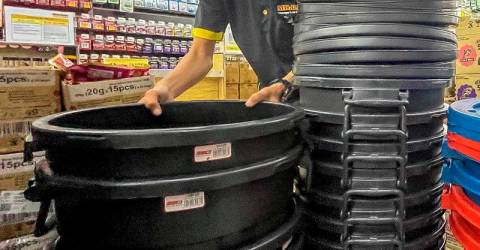Do not store edible items in rubbish bins, traders warned

Source: thesun.my
PETALING JAYA: Food sellers have been warned not to store their perishable items in rubbish bins as doing so would cause harmful pathogens to quickly reproduce.
UiTM Centre for Environmental Health and Safety Studies Assoc Prof Dr Farah Ayuni Shafie was commenting on a widely circulated post on X, where a user complained that a seller used black rubbish bins to store fresh squid in water for his eatery business.
The post said the seller continued the practice despite being warned against doing so.
"Many people have advised him to stop storing seafood in the bins, but he justifies it by saying that others are also doing it, so it's not an issue.
"It is very frustrating to get this kind of response, especially when it comes to food preparation," the user said in his post.
Farah Ayuni said such practices are dangerous and could cause salmonellosis, E. coli infections and listeriosis to flourish and reproduce in unclean environments.
"This is especially so when perishable food is stored in unsuitable containers such as rubbish bins, which may also be stored in open areas where rodents and pests leave behind traces of urine and faeces.
"The risk of falling ill from diseases significantly escalates when perishable food items are later stored in them."
She said the presence of rodent and pest droppings, and other contaminants will pollute the food stored in bins and increase the likelihood of foodborne illness transmitted to consumers.
She added that certain materials used to make the rubbish bins can leach harmful chemicals into the water or food it stores, which is how those chemicals get into our bodies.
She said food sellers should opt for other alternatives for storage, such as food-grade plastic containers, resealable bags or airtight containers.
She also said clear communication and following food safety regulations are essential to mitigate cross-contamination and ensure consumers are safe when purchasing food for consumption.
"Consumers expect their food to be handled and served in a manner consistent with hygiene standards. When this is not met due to improper storage choices or other factors, it can undermine trust in the eatery."
Farah Ayuni said food-grade containers play a critical role in ensuring the safety and quality of stored food and beverages that are specifically designed to prevent microbial and chemical contamination.
"Unlike normal plastics, which may not meet the same stringent standards, food-grade containers are manufactured under specific regulations.
"By adhering to these higher manufacturing standards, food-grade plastics provide consumers with peace of mind, knowing that their food and drink items are stored in containers that prioritise safety and quality."
She said consumers who observe poor hygiene standards and food storage conditions must report their concerns to the relevant authorities.
"Businesses that violate food storage regulations face significant penalties, including substantial fines and the suspension or revocation of operating licences under the Food Act 1983.
"The authorities can also order the closure of premises in severe cases to protect public health.
"Serious breaches can lead to criminal prosecution, resulting in higher fines and possible imprisonment, so it's always wise for eateries to ensure they follow the law," she said.



